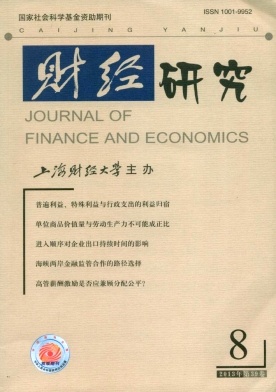取消化石能源补贴对我国居民收入分配的影响——基于投入产出价格模型的模拟分析
财经研究 2013 年 第 39 卷第 08 期, 页码:18 - 28
摘要
参考文献
摘要
文章在总结不同收入居民能源消费特征的基础上,采用投入产出价格模型,分别在有无政府价格管制的情境下,模拟分析了中国取消化石能源补贴的分配影响。结果表明:(1)取消不同能源补贴的分配影响有所差异,从综合影响看,取消交通燃料补贴的累进性最强,取消煤炭补贴的累进性最弱,而取消电力补贴的影响是累退的,其中取消成品油补贴对居民冲击最大,其次是电力,煤炭的影响最小;(2)补贴改革对居民的间接影响大于直接影响;(3)政府的价格管制能够减轻补贴改革的负向冲击。能源补贴改革可从累进性强、影响力小的能源如交通燃料开始,并采取一定的补偿措施以减轻改革对贫困居民的冲击。
[1]李虹,董亮,谢明华.取消燃气和电力补贴对我国居民生活的影响[J].经济研究,2011,(2):100-112.
[2]林伯强.能源价格上涨将带来成本推动型通胀[N].新浪财经,2011-2-28.
[3]林伯强,蒋竺均,林静.有目标的电价补贴有助于能源公平和效率[J].金融研究,2009,(11):1-18.
[4]Andriamihaja N,Vecchi G.An evaluation of the welfare impact of higher energy prices in Madagascar[R].Africa Region Working Paper Series No.106,2007.
[5]Clements B,Jung H,Gupta S.Real and distributive effects of petroleum price libera-lization:The case of Indonesia[J].Developing Economies,2007,45(2):220-237.
[6]Gangopadhyay S,Ramaswami B,Wadhwa W.Reducing subsidies on household fuels in India:How will it affect the poor[J].Energy Policy,2005,33(18):2326-2336.
[7]IEA.World energy outlook[M].Paris:International Energy Agency,2008.
[8]IEA.World energy outlook[M].Paris:International Energy Agency,2010.
[9]Jensen J,Tarr D.Trade,foreign exchange,and energy policies in the Islamic Republic of Iran:Reform agenda,economic implications,and impact on the poor[R].Policy Re-search Working Paper No.2768The World Bank,2002.
[10]Kebede B.Energy subsidies and costs in urban Ethiopia:The cases of kerosene and e-lectricity[J].Renewable Energy,2006,31(13):2140-2151.
[11]Kpodar K.Distributional effects of oil price changes on household expenditures:Evi-dence from Mali[R].IMF Working Paper No.06/91,2006.
[12]Lin B Q,Jiang Z J.Estimates of energy subsidies in China and impact of energy subsi-dy reform[J].Energy Economics,2011,33(2):273-283.
[2]林伯强.能源价格上涨将带来成本推动型通胀[N].新浪财经,2011-2-28.
[3]林伯强,蒋竺均,林静.有目标的电价补贴有助于能源公平和效率[J].金融研究,2009,(11):1-18.
[4]Andriamihaja N,Vecchi G.An evaluation of the welfare impact of higher energy prices in Madagascar[R].Africa Region Working Paper Series No.106,2007.
[5]Clements B,Jung H,Gupta S.Real and distributive effects of petroleum price libera-lization:The case of Indonesia[J].Developing Economies,2007,45(2):220-237.
[6]Gangopadhyay S,Ramaswami B,Wadhwa W.Reducing subsidies on household fuels in India:How will it affect the poor[J].Energy Policy,2005,33(18):2326-2336.
[7]IEA.World energy outlook[M].Paris:International Energy Agency,2008.
[8]IEA.World energy outlook[M].Paris:International Energy Agency,2010.
[9]Jensen J,Tarr D.Trade,foreign exchange,and energy policies in the Islamic Republic of Iran:Reform agenda,economic implications,and impact on the poor[R].Policy Re-search Working Paper No.2768The World Bank,2002.
[10]Kebede B.Energy subsidies and costs in urban Ethiopia:The cases of kerosene and e-lectricity[J].Renewable Energy,2006,31(13):2140-2151.
[11]Kpodar K.Distributional effects of oil price changes on household expenditures:Evi-dence from Mali[R].IMF Working Paper No.06/91,2006.
[12]Lin B Q,Jiang Z J.Estimates of energy subsidies in China and impact of energy subsi-dy reform[J].Energy Economics,2011,33(2):273-283.
引用本文
蒋竺均, 邵帅. 取消化石能源补贴对我国居民收入分配的影响——基于投入产出价格模型的模拟分析[J]. 财经研究, 2013, 39(8): 18–28.
导出参考文献,格式为:





 5925
5925  3130
3130

